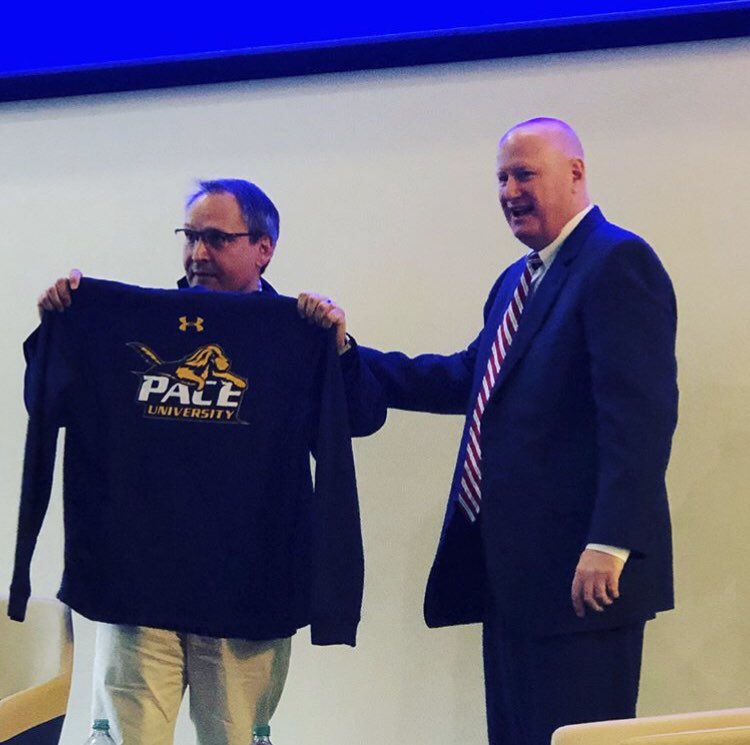ESPN Guest Speaker Promotes Self-acceptance in Q & A session held by Pace Athletics and Lubin School of Business
The Pace Athletics Department and the Lubin School of Business hosted a Q & A session with ESPN Vice President of Corporate Citizenship Kevin Martinez for the 50+ students and faculty members last Tuesday in the Kessel Gottesman Room.
The Q & A, moderated by Pace Athletic Director Mark Brown, gave Martinez an opportunity to share his knowledge of sports marketing and corporate responsibility with the crowd, which was mostly full of athletes and/or business students.
While Martinez discussed ESPN’s new initiatives such as ShredHate, an anti-bullying campaign, and the company’s investment in E-Sports coverage, the 25-year ESPN veteran’s main message was self-acceptance and how it can be an asset in the business world.
“Do not give up on who you are and be who you are,” Martinez said. “If you are not who you are, you are kidding yourself.”
Martinez knows a great deal about the challenge of self-acceptance and overcoming fear due the times of tribulation he has faced.
He faced the challenge of growing up dyslexic in a poor school system, and for years, faced the fear of being an out gay man in the business world.
Martinez believed revealing his sexual orientation would be a hindrance to his success in the private or public sector until a phone call with then-Washington King County Executive Gary Locke, who later became Washington’s Governor and the U.S. Ambassador to China.
“When I worked for Gary Locke, he called me and asked me to run his community relations executive office and I said, ‘I can’t because I’m gay,’” Martinez recalled. “And he said, ‘Why is that a problem?’ And from that moment on, I swear to you, I never ever looked back. Because it turns out, what I thought was problematic, really isn’t.”
The adversity Martinez overcame stood out to many in attendance, including sophomore Izabella Morris.
“As someone who is a queer person of color, I related with him because he is also a queer person of color,” Morris said. “I thought it was really important that he emphasized being yourself. You want to be working for a company who likes you for you and not just the interview ready version of yourself.”
Senior Field Hockey player Margaret Maclean and former men’s lacrosse player Christopher Howard were also moved by Martinez’s words of advice and the struggles he overcame.
“He said one thing that really stood out, which was, ‘Power defines people but how you use that power is how you’re going to be defined,’” the Maclean said. “I felt the conversation on how him coming out really helped him become his true self was important and interesting. I think a lot of us have this idea of how we want to depict our self to the people we want to work for and put on this front.”
“A point I took away from [Martinez] is how he’s always faced adversity as a gay man, and how he overcame obstacles that may have not been in his favor,” Howard said, a sophomore. “I thought that was good advice for students that anything we face, we can always overcome it.”
Those in attendance also appreciated the information Martinez provided on ESPN and the company’s marketing strategies and goals.
When the Q & A session closed, Morris was one of many students who had one-on-one conversations with Martinez about ESPN’s initiatives.
“I wanted to know what it was like for him being in the sports industry because that’s an industry I also see myself in,” Morris, a business management and sports marketing major. “I wanted to know what the culture of ESPN was and if businesses only wanted to be involved in cause marketing because they might gain a profit. I see that they do cause marketing to make a difference in society, and they gain revenue, which is just an extra plus.”
Your donation supports independent, student-run journalism at Pace University. Support the Pace Chronicle to help cover publishing costs.

